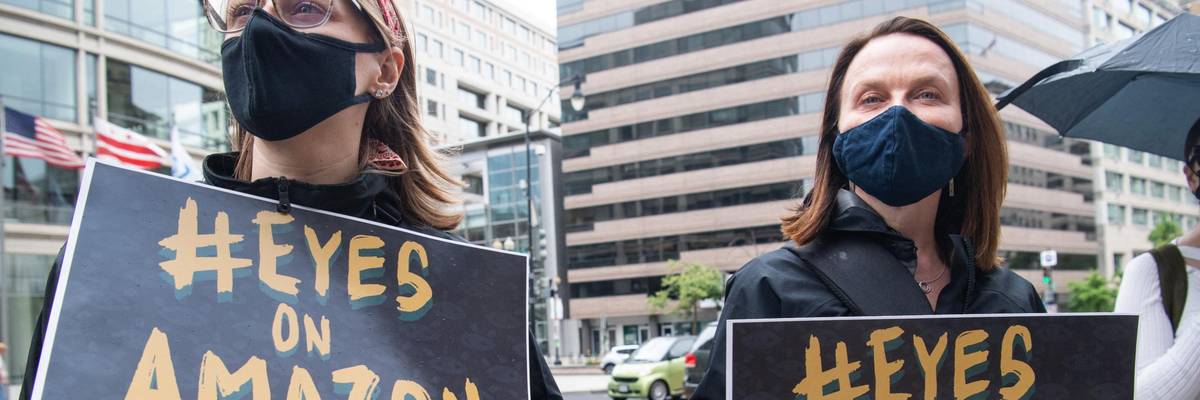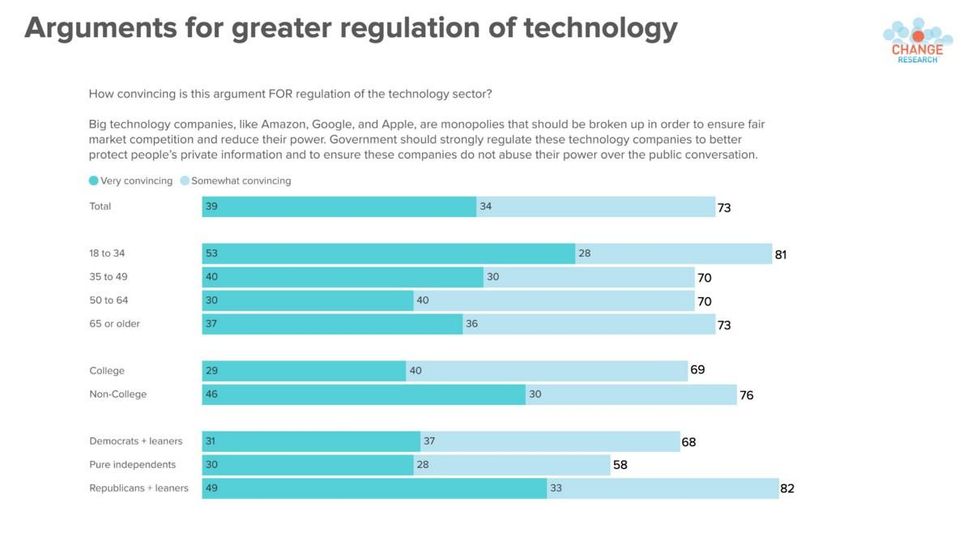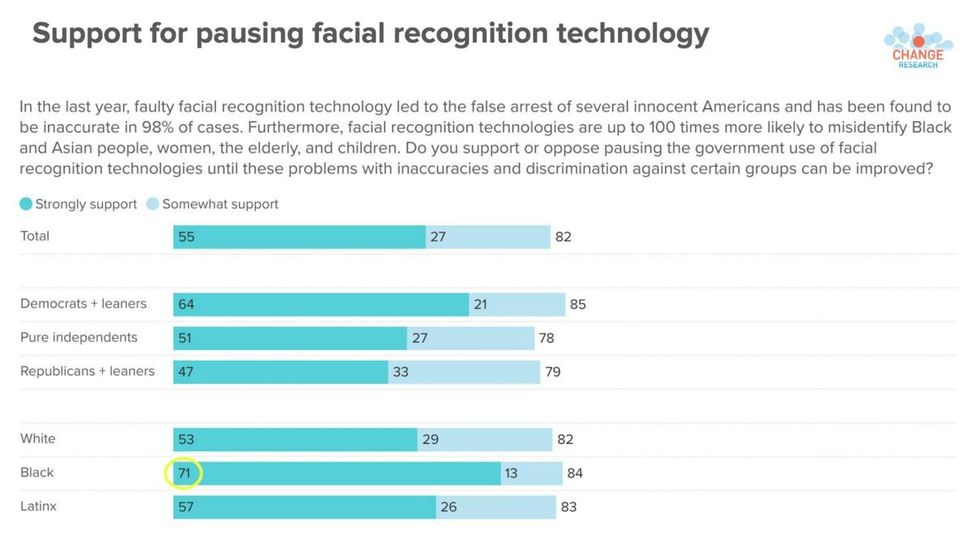

SUBSCRIBE TO OUR FREE NEWSLETTER
Daily news & progressive opinion—funded by the people, not the corporations—delivered straight to your inbox.
5
#000000
#FFFFFF
To donate by check, phone, or other method, see our More Ways to Give page.


Daily news & progressive opinion—funded by the people, not the corporations—delivered straight to your inbox.

Protestors, including Amazon workers and community allies, demonstrate against Amazon's working conditions and company policies at the offices of the investment firm BlackRock, one of the company's largest shareholders, in Washington, D.C. on May 24, 2021. (Photo: Saul Loeb/AFP via Getty Images)
Advocates for breaking up internet monopolies on Thursday pointed to a new polling that shows overwhelming U.S. public support for curbing the power of Big Tech as evidence that Congress should forge ahead with antitrust bills aimed at better regulating some of the world's most powerful corporations.
"Policymakers should respond to this clear demand from voters by enacting laws and regulations that will improve choice, protect consumers, and reduce discrimination."
--Erin Simpson,
CAP Action
A nationwide survey (pdf) of 1,200 registered voters commissioned by the Center for American Progress (CAP) Action Fund and Public Citizen and conducted by Change Research found that while Americans were evenly split over the question of whether they believe tech companies are "mostly good" or "mostly bad" for the country, 81% of all respondents agreed that large tech companies and social media have "too much power and influence over politics and government."
Two-thirds of Democrat-leaning voters, 76% of Independents, and 96% of Republicans polled agreed with that statement.
Survey respondents were also asked whether believe that "big technology companies like Amazon, Google, and Apple are monopolies that should be broken up to ensure fair market competition and reduce their power," and that "government should strongly regulate these technology companies to better protect people's private information and to ensure these companies do not abuse their power over the public conversation." A majority of voters found the statement either "somewhat" or "very convincing," regardless of age, educational level, or political affiliation.

Nearly all--98%--of the surveyed voters said they "strongly" or "somewhat" supported regulations aimed at ensuring that tech companies don't abuse user data, use "deceptive or unfair" practices, or violate their civil rights. Nearly as many respondents--96%--were also at least somewhat in favor of allowing people to sue tech companies over privacy breaches.
Other proposed policies and actions were extremely popular among all surveyed voters, including:
A majority of queried voters regardless of race or political affiliation also supported pausing the use of facial recognition technologies--which can be up to 100 times more likely to misidentify Black and Asian people, women, the elderly, and children--"until these problems with inaccuracies and discrimination against certain groups can be improved."

"These results indicate that the U.S. House Judiciary Committee's antitrust bills, which put forth numerous ideas to rein in Big Tech's power, enjoy broad, bipartisan support from Americans," Public Citizen said in a statement.
The House Judiciary Committee last month approved a six-bill antitrust package aimed at more robustly regulating or breaking up tech companies. The most contentious of the measures, the Ending Platform Monopolies Act (pdf)--which would make it illegal for dominant platforms to create their own businesses in order to gain an unfair advantage over their competitors--passed the committee by a single vote.
If passed, the bill could force Apple to spin off its app store or even its iOS software, while Amazon could be forced to stop selling its private-label brands on its website and Google might have to sell YouTube.
"When it comes to Big Tech's monopoly power and surveillance business model, the public is unified: They want action. They want to see the Big Tech companies broken up and users' privacy protected," Public Citizen president Robert Weissman said in a statement.
"Big Tech will sling tens of millions of dollars, or more, to block anti-monopoly and pro-privacy legislation, but members of Congress who do the right thing should know the public will have their back," Weissman added. "It's the lawmakers who refuse to act who have something to fear."
Erin Simpson, associate director of technology policy at CAP Action, said that "this new survey shows widespread support from voters across the political spectrum for stronger and better regulation of the tech companies that play an increasingly large role in our everyday lives."
Simpson added that "policymakers should respond to this clear demand from voters by enacting laws and regulations that will improve choice, protect consumers, and reduce discrimination."
Dear Common Dreams reader, The U.S. is on a fast track to authoritarianism like nothing I've ever seen. Meanwhile, corporate news outlets are utterly capitulating to Trump, twisting their coverage to avoid drawing his ire while lining up to stuff cash in his pockets. That's why I believe that Common Dreams is doing the best and most consequential reporting that we've ever done. Our small but mighty team is a progressive reporting powerhouse, covering the news every day that the corporate media never will. Our mission has always been simple: To inform. To inspire. And to ignite change for the common good. Now here's the key piece that I want all our readers to understand: None of this would be possible without your financial support. That's not just some fundraising cliche. It's the absolute and literal truth. We don't accept corporate advertising and never will. We don't have a paywall because we don't think people should be blocked from critical news based on their ability to pay. Everything we do is funded by the donations of readers like you. Will you donate now to help power the nonprofit, independent reporting of Common Dreams? Thank you for being a vital member of our community. Together, we can keep independent journalism alive when it’s needed most. - Craig Brown, Co-founder |
Advocates for breaking up internet monopolies on Thursday pointed to a new polling that shows overwhelming U.S. public support for curbing the power of Big Tech as evidence that Congress should forge ahead with antitrust bills aimed at better regulating some of the world's most powerful corporations.
"Policymakers should respond to this clear demand from voters by enacting laws and regulations that will improve choice, protect consumers, and reduce discrimination."
--Erin Simpson,
CAP Action
A nationwide survey (pdf) of 1,200 registered voters commissioned by the Center for American Progress (CAP) Action Fund and Public Citizen and conducted by Change Research found that while Americans were evenly split over the question of whether they believe tech companies are "mostly good" or "mostly bad" for the country, 81% of all respondents agreed that large tech companies and social media have "too much power and influence over politics and government."
Two-thirds of Democrat-leaning voters, 76% of Independents, and 96% of Republicans polled agreed with that statement.
Survey respondents were also asked whether believe that "big technology companies like Amazon, Google, and Apple are monopolies that should be broken up to ensure fair market competition and reduce their power," and that "government should strongly regulate these technology companies to better protect people's private information and to ensure these companies do not abuse their power over the public conversation." A majority of voters found the statement either "somewhat" or "very convincing," regardless of age, educational level, or political affiliation.

Nearly all--98%--of the surveyed voters said they "strongly" or "somewhat" supported regulations aimed at ensuring that tech companies don't abuse user data, use "deceptive or unfair" practices, or violate their civil rights. Nearly as many respondents--96%--were also at least somewhat in favor of allowing people to sue tech companies over privacy breaches.
Other proposed policies and actions were extremely popular among all surveyed voters, including:
A majority of queried voters regardless of race or political affiliation also supported pausing the use of facial recognition technologies--which can be up to 100 times more likely to misidentify Black and Asian people, women, the elderly, and children--"until these problems with inaccuracies and discrimination against certain groups can be improved."

"These results indicate that the U.S. House Judiciary Committee's antitrust bills, which put forth numerous ideas to rein in Big Tech's power, enjoy broad, bipartisan support from Americans," Public Citizen said in a statement.
The House Judiciary Committee last month approved a six-bill antitrust package aimed at more robustly regulating or breaking up tech companies. The most contentious of the measures, the Ending Platform Monopolies Act (pdf)--which would make it illegal for dominant platforms to create their own businesses in order to gain an unfair advantage over their competitors--passed the committee by a single vote.
If passed, the bill could force Apple to spin off its app store or even its iOS software, while Amazon could be forced to stop selling its private-label brands on its website and Google might have to sell YouTube.
"When it comes to Big Tech's monopoly power and surveillance business model, the public is unified: They want action. They want to see the Big Tech companies broken up and users' privacy protected," Public Citizen president Robert Weissman said in a statement.
"Big Tech will sling tens of millions of dollars, or more, to block anti-monopoly and pro-privacy legislation, but members of Congress who do the right thing should know the public will have their back," Weissman added. "It's the lawmakers who refuse to act who have something to fear."
Erin Simpson, associate director of technology policy at CAP Action, said that "this new survey shows widespread support from voters across the political spectrum for stronger and better regulation of the tech companies that play an increasingly large role in our everyday lives."
Simpson added that "policymakers should respond to this clear demand from voters by enacting laws and regulations that will improve choice, protect consumers, and reduce discrimination."
Advocates for breaking up internet monopolies on Thursday pointed to a new polling that shows overwhelming U.S. public support for curbing the power of Big Tech as evidence that Congress should forge ahead with antitrust bills aimed at better regulating some of the world's most powerful corporations.
"Policymakers should respond to this clear demand from voters by enacting laws and regulations that will improve choice, protect consumers, and reduce discrimination."
--Erin Simpson,
CAP Action
A nationwide survey (pdf) of 1,200 registered voters commissioned by the Center for American Progress (CAP) Action Fund and Public Citizen and conducted by Change Research found that while Americans were evenly split over the question of whether they believe tech companies are "mostly good" or "mostly bad" for the country, 81% of all respondents agreed that large tech companies and social media have "too much power and influence over politics and government."
Two-thirds of Democrat-leaning voters, 76% of Independents, and 96% of Republicans polled agreed with that statement.
Survey respondents were also asked whether believe that "big technology companies like Amazon, Google, and Apple are monopolies that should be broken up to ensure fair market competition and reduce their power," and that "government should strongly regulate these technology companies to better protect people's private information and to ensure these companies do not abuse their power over the public conversation." A majority of voters found the statement either "somewhat" or "very convincing," regardless of age, educational level, or political affiliation.

Nearly all--98%--of the surveyed voters said they "strongly" or "somewhat" supported regulations aimed at ensuring that tech companies don't abuse user data, use "deceptive or unfair" practices, or violate their civil rights. Nearly as many respondents--96%--were also at least somewhat in favor of allowing people to sue tech companies over privacy breaches.
Other proposed policies and actions were extremely popular among all surveyed voters, including:
A majority of queried voters regardless of race or political affiliation also supported pausing the use of facial recognition technologies--which can be up to 100 times more likely to misidentify Black and Asian people, women, the elderly, and children--"until these problems with inaccuracies and discrimination against certain groups can be improved."

"These results indicate that the U.S. House Judiciary Committee's antitrust bills, which put forth numerous ideas to rein in Big Tech's power, enjoy broad, bipartisan support from Americans," Public Citizen said in a statement.
The House Judiciary Committee last month approved a six-bill antitrust package aimed at more robustly regulating or breaking up tech companies. The most contentious of the measures, the Ending Platform Monopolies Act (pdf)--which would make it illegal for dominant platforms to create their own businesses in order to gain an unfair advantage over their competitors--passed the committee by a single vote.
If passed, the bill could force Apple to spin off its app store or even its iOS software, while Amazon could be forced to stop selling its private-label brands on its website and Google might have to sell YouTube.
"When it comes to Big Tech's monopoly power and surveillance business model, the public is unified: They want action. They want to see the Big Tech companies broken up and users' privacy protected," Public Citizen president Robert Weissman said in a statement.
"Big Tech will sling tens of millions of dollars, or more, to block anti-monopoly and pro-privacy legislation, but members of Congress who do the right thing should know the public will have their back," Weissman added. "It's the lawmakers who refuse to act who have something to fear."
Erin Simpson, associate director of technology policy at CAP Action, said that "this new survey shows widespread support from voters across the political spectrum for stronger and better regulation of the tech companies that play an increasingly large role in our everyday lives."
Simpson added that "policymakers should respond to this clear demand from voters by enacting laws and regulations that will improve choice, protect consumers, and reduce discrimination."